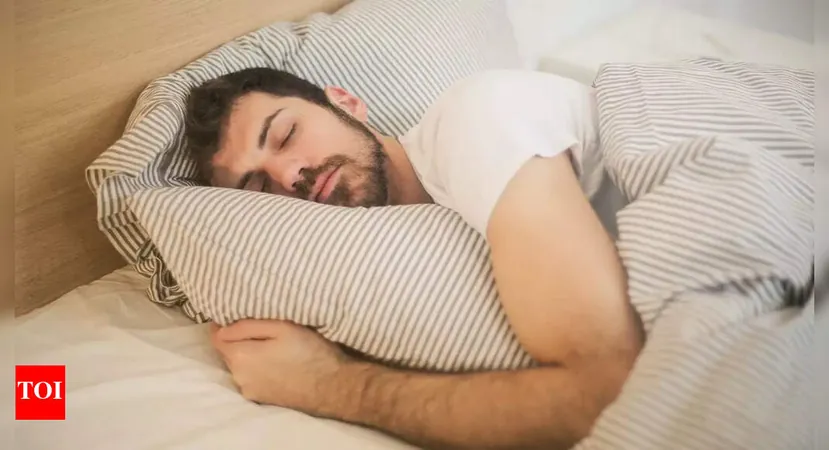
Unlocking the Mystery: How Some People Thriving on Just 3 Hours of Sleep Could Change Everything!
2025-06-01
Author: Mei
Meet the Natural Short Sleepers: The Elite Who Need Less Sleep
For decades, conventional wisdom insisted that adults should clock in seven to eight hours of sleep each night to stay healthy and alert. But what if this advice doesn’t apply to everyone? Enter the remarkable natural short sleepers—individuals genetically programmed to function optimally on just three to five hours of sleep, completely bypassing the mental fog and irritability that typically plague those who skimp on rest.
The Science Behind FNSS: A Genetic Marvel
This fascinating phenomenon, known as Familial Natural Short Sleep (FNSS), has been making waves in the scientific community. Pioneering studies have uncovered specific genetic mutations like DEC2 and SIK3 that enable these extraordinary individuals to complete essential sleep processes in a fraction of the time, emerging not just awake, but thriving and high-performing.
The Life of a Natural Short Sleeper: Energized and Resilient
Natural short sleepers are not caffeine-fueled workaholics; they are simply unique in their genetic makeup. Researchers, led by Dr. Ying-Hui Fu at UCSF, have found that these individuals sleep consistently less—around three to four hours—while maintaining mental sharpness and physical health. They don't suffer from the adverse effects typically associated with sleep deprivation, showing incredible energy and resilience instead.
How Genetics Could Revolutionize Sleep Medicine
The journey into FNSS began with Dr. Fu’s groundbreaking study published in 2009, which identified the DEC2 gene mutation in family members who consistently thrived on minimal sleep. More recently, Dr. Fu and her team discovered multiple mutations across various genes involved in sleep regulation. These findings could pave the way for groundbreaking therapies that mimic these genetic advantages, potentially offering hope to millions struggling with sleep disorders like insomnia.
The Dark Side of Less Sleep: Don’t Try This at Home
It’s important to highlight a critical distinction: FNSS is not something you can train yourself into. Most people sleeping less than six hours accumulate harmful sleep debt, leading to severe health issues, including heart disease and depression. So unless you’ve been genetically validated as a natural short sleeper, cutting your sleep short can be hazardous.
How Does Sleep Actually Work? Understanding the Restoration Cycle
Sleep isn’t merely a passive state; it's a complex biological process governed by our circadian rhythm. During a typical night, adults cycle through various sleep stages, including deep sleep and REM sleep, crucial for physical restoration and mental clarity. Natural short sleepers condense these cycles, achieving the restorative benefits of sleep in less time.
Are You a Natural Short Sleeper? Here's How to Find Out
Could you be part of this elite group? Researchers have identified key traits of natural short sleepers: they consistently sleep just three to five hours yet wake fully refreshed, don’t need naps, and exhibit high energy and productivity. However, self-diagnosis is risky—consult a sleep specialist for confirmation.
The Future of Sleep: Genetic Engineering on the Horizon?
With advancements in genetic research, the idea of using CRISPR or similar technologies to grant individuals FNSS traits is not far-fetched. While ethical considerations remain, the study of FNSS aims to unravel the biological mysteries of sleep, opening doors to potentially life-changing applications in health and beyond. Natural short sleepers challenge long-held beliefs about sleep needs, suggesting a future where our nightly rest could be as personalized as our DNA.

 Brasil (PT)
Brasil (PT)
 Canada (EN)
Canada (EN)
 Chile (ES)
Chile (ES)
 Česko (CS)
Česko (CS)
 대한민국 (KO)
대한민국 (KO)
 España (ES)
España (ES)
 France (FR)
France (FR)
 Hong Kong (EN)
Hong Kong (EN)
 Italia (IT)
Italia (IT)
 日本 (JA)
日本 (JA)
 Magyarország (HU)
Magyarország (HU)
 Norge (NO)
Norge (NO)
 Polska (PL)
Polska (PL)
 Schweiz (DE)
Schweiz (DE)
 Singapore (EN)
Singapore (EN)
 Sverige (SV)
Sverige (SV)
 Suomi (FI)
Suomi (FI)
 Türkiye (TR)
Türkiye (TR)
 الإمارات العربية المتحدة (AR)
الإمارات العربية المتحدة (AR)